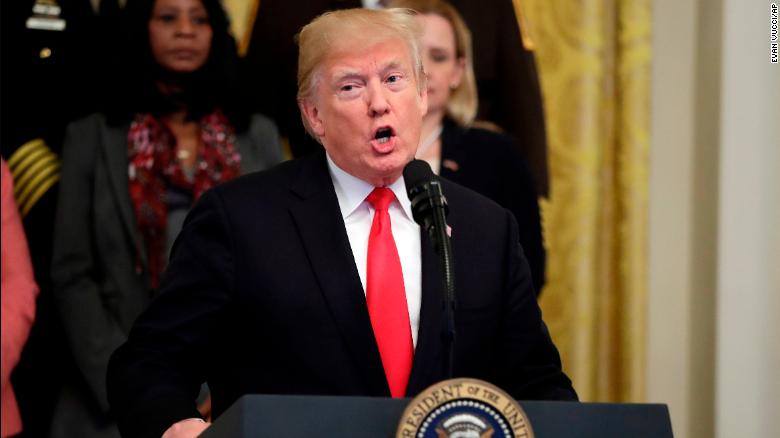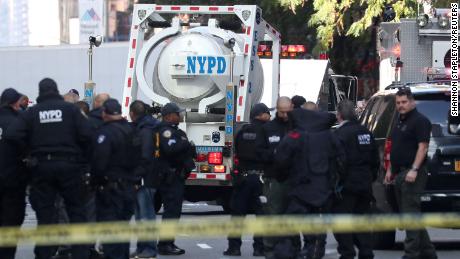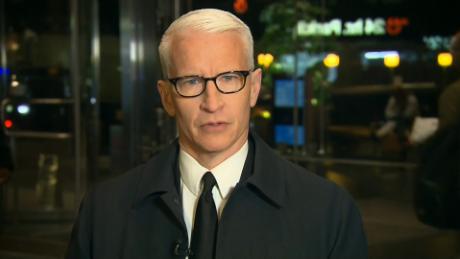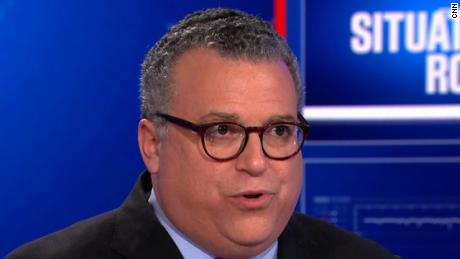(CNN)Don't expect Donald Trump to repent for heating America's politics to a bitter boiling point, despite a day that could have turned into a tragedy after an unknown suspect mailed bombs to the President's favorite targets.
Trump did just about the bare minimum expected after the attempted attacks using improvised explosives on two of his predecessors, several other prominent political critics and the New York offices of CNN.
He called for national unity, promised to bring those responsible to justice and warned that political violence was an "attack on our democracy itself."
But there was no public acknowledgment that there can be consequences to the nation's most conspiratorial rhetoric and demagoguery -- violent, dehumanizing language he himself has spread as he lashes out at his opponents and whips up his supporters.
Characteristically, he undermined his scripted invocations of unity with fresh attacks of his own, implicitly blaming people who criticize him, the media and Democrats for the nation's dangerous political divides. He kept up the attacks Thursday morning, tweeting that "a very big part of the Anger we see today in our society is caused by the purposely false and inaccurate reporting of the Mainstream Media."
In effect, the President has chosen not to rise above the tumult or even console or counsel those who opposed him.
He did not mention the victims by name. Or give any indication that he is concerned that some people might see his flaming rhetoric as a spur to violence.
Trump's response to Wednesday's events was a reminder of the gap between presidential expectations and performance that has often been evident in his response to grave national moments, crises and natural disasters.
His defenders will argue that it is absurd that attacks against public figures and the media by an isolated "crazy person" could be blamed on a President -- who clearly had nothing to do with orchestrating the specific act.
They will also point out that Republicans can also come under fire: Republican Rep. Steve Scalise was severely injured in a shooting spree by a gunman who posted anti-Trump rhetoric on social media and supported Bernie Sanders, a Democratic presidential contender.
But it was perhaps not surprising that the President should not even reflect on how the fearsome political climate plays into such behavior -- even though the man in the Oval Office is often looked upon to set a moral example.
Presidential historian Doris Kearns Goodwin told CNN's Don Lemon that Trump had missed a chance to show leadership. She said he could have styled the attempted attack on Presidents Bill Clinton and Barack Obama as an attack on all presidents, and the bomb sent to CNN as an attack on the free media.
"Everybody is hungering for that real unification," she said.
However, Trump's political method has often been based upon portraying opponents as a threat to America, eviscerating their characters and tearing at the nation's most painful political, social and racial divides.
People with long political memories are becoming increasingly worried. Half a century on from a year of blood and torment, 1968, which saw the political assassinations of Robert F. Kennedy and Martin Luther King, Jr., there are again fears that sooner or later, a seething national mood will produce a tragedy that will haunt America for decades.
Trump only goes so far
Trump opened a rally in Wisconsin by condemning violence. But he then went on to lay blame elsewhere -- against some of the targets who were in the sights of the unknown bombmaker.
"We should not mob people in public spaces or destroy public property," Trump said, in a reference to liberal protests against GOP politicians.
In order to bridge political divides, he said, "the media also has a responsibility to set a civil tone and to stop the endless hostility and constant negative and oftentimes false attacks and stories."
The President also openly mocked calls for him to tone down his fiery style at Wednesday's event, a somewhat more subdued rally in which he eschewed some of his recent and most extreme attacks.
"I'm trying to be nice," he quipped. "Do you see how nice I'm behaving tonight?"
But Trump could not even bring himself to utter the names of former 2016 rival Hillary Clinton or former Presidents Clinton and Obama, after what were in essence assassination attempts and an attack on the presidency itself -- an institution that he now holds in trust.
White House sources told CNN that Trump had made no attempt to reach out to the former commanders-in-chief.
It was not the first time that critics had faulted Trump for not doing enough to cool political tensions. Last year, in Charlottesville, Virginia, he saw blame for "both sides" in violence that claimed the life of a young female anti-racism protester at a white supremacist rally.
His remarks in Wisconsin were a clear sign that though the White House sees a duty to track down the bombmaker and prevent future attacks, it also believes there is no link between them and Trump's rhetoric.
But had even one of Wednesday's devices, which authorities said were rudimentary but still threatening, exploded, America could have been mourning victims of a political debate that is raging out of control.
For many observers, Wednesday's drama was a sign that overheated political arguments have reached a perilous point.
"These attempted bombings are a clear sign that our civil discourse is so off track that it is becoming a national security threat," said Dr. Carolyn Lukensmeyer, executive director of the National Institute for Civil Discourse.
"There could be no stronger evidence that our words matter and have consequences," she said in a statement.
All blame is not equally shared
The President's insistence that all sides were to blame for the political climate also ignores his own prominent role in dragging public life into the gutter that is so unconventional that it undermines critiques that all politicians are equally to blame.
There is only one President who indulges his angry crowds when they shout "lock her up, lock her up," about Hillary Clinton -- a call for a political opponent to be thrown in jail.
There is only one President who has called the press "the enemy of the people" and who grins as his crowds berate reporters.
There is only one President who has praised a fellow Republican lawmaker for assaulting a reporter, as he did on the campaign trail last week.
It is not clear that the President could cool the rhetoric if he wanted to. What critics see as a wild and dangerous style is viewed by Trump loyalists as the golden key to his crusade against political correctness.
Trump's willingness to break the conventions of decorum and decency with demolishing attacks on his rivals, and a disregard for civility, are inseparable from his political appeal to the base on which he has built his political career.
But Wednesday's incidents are a reminder that in such a climate, somebody could get seriously hurt or even killed.
"The President and his allies, they need to dial down the political rhetoric," said Carrie Cordero, an adjunct professor at Georgetown Law, who is also a CNN analyst. "They are making people less safe, they are making journalists less safe, they are making law enforcement officials less safe."








